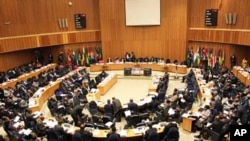More than 25 African leaders are in Ethiopia's capital for a two-day summit focusing mainly on political and security concerns.
The annual gathering, beginning Sunday, will feature mini-summits on Ivory Coast, Sudan and Somalia, as well as discuss several other hotspots, such as Niger and Madagascar.
However, AU Commission Chairman Jean Ping says two of the continent's late-breaking political crises, in Egypt and Tunisia, will not be on the agenda. He said developments in those countries erupted too late to be included in his report to the summit.
U.N. Secretary General Ban Ki-moon arrived in Addis Ababa Saturday and will chair the mini-summits on Ivory Coast and Sudan.
The Ivory Coast summit is expected to give a fresh push to diplomatic efforts to break the country's political stalemate in which incumbent leader Laurent Gbagbo refuses to yield power to Alassane Ouattara.
Most countries recognize Mr. Ouattara as the winner of the presidential race. A panel of five heads of state is to be named Sunday to settle the dispute.
In a pre-summit session, AU foreign ministers endorsed Kenya's move to block International Criminal Court indictments of six alleged masterminds of ethnic violence after the country's disputed 2007 election. The heads of state are expected to do the same in their final communique.
On Wednesday, Australia's foreign ministry warned its citizens in Ethiopia that terrorists may be plotting bomb attacks during the African Union summit. The Australian government warned it has credible information that extremists plan to target Western interests and bomb unspecified locations in Addis Ababa.
AU Summit to Focus on Security Concerns
